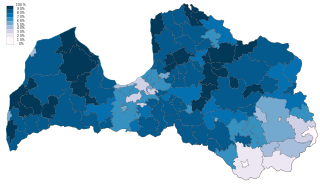
Latgale is one of the four historical and cultural regions of Latvia recognised in the Constitution of the Republic of Latvia. It is the easternmost region north of the Daugava River. While most of Latvia is historically Lutheran, Latgale is predominantly Roman Catholic, in fact, according to a 2011 survey, 65.8% of the total population is Catholic. There is also a strong Eastern Orthodox minority, comprising the 23.8%, divided in 13.8% Russian Orthodox Christians and 10.0% Old Believers.

Latgalians, sometimes also Ancient Latvians, were an ancient Baltic tribe.
This article gives an overview of liberalism in Latvia. It is limited to liberal parties with substantial support, mainly proved by having had a representation in the Saeima. The sign ⇒ denotes another party in that scheme. For inclusion in this scheme it isn't necessary so that parties labelled themselves as a liberal party.
Latgalian is a Baltic language spoken in Latgale, the eastern part of Latvia. It is debated whether it is a separate language with heavy Latvian influence, due to historical mutual exposure, or a distinct dialect of Latvian. Nevertheless, its standardized form is recognized and protected as a "historical variety of the Latvian language" (vēsturisks latviešu valodas paveids) by Latvian law. The 2011 Latvian census established that 8.8% of Latvia's inhabitants, or 164,500 people, speak Latgalian daily. 97,600 of them live in Latgale, 29,400 in Riga and 14,400 in the Riga region.
The Light of Latgale was a Latgalian regionalist political party in Latvia.
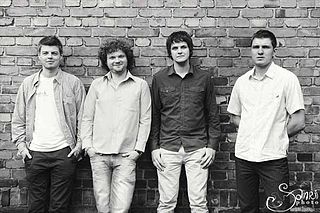
Dabasu Durovys is a Latvian pop rock band, formed at the beginning of 2006 in Daugavpils. Most lyrics of their songs are written in Latgalian. The band's name is Latgalian for "the doors of the sky".
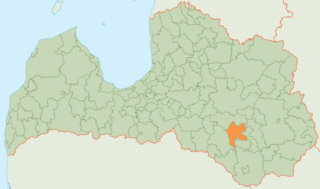
Līvāni Municipality is a municipality in Latgale, Latvia. The municipality was formed in 1999 by merging Rožupe Parish, Turki Parish and Līvāni town. In 2009 it absorbed Jersika Parish, Rudzāti Parish and Sutri Parish, too the administrative centre being Līvāni.
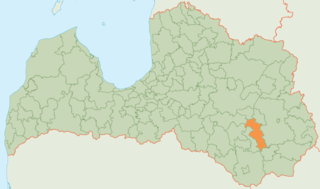
Riebiņi Municipality is a municipality in Latgale, Latvia. The municipality was formed in 2004 by merging Galēni parish, Riebiņi parish, Rušona parish, Silajāņi parish, Sīļukalns parish and Stabulnieki parish, the administrative centre being Riebiņi.

The Latgalians are the ethnic Latvians of Latgale, who speak Latgalian, a distinct dialect of Latvian, and share a common culture that sets them apart from other Latvians.
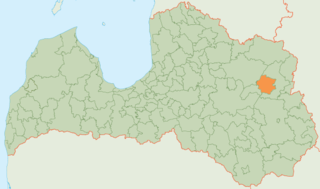
Rugāji Municipality is a municipality in Latgale, Latvia. The municipality was formed in 2009 by merging Rugāji parish and Lazdukalns parish the administrative centre being Rugāji.
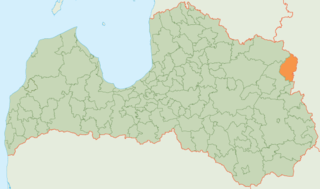
Viļaka Municipality is a municipality in Latgale, Latvia. The municipality was formed in 2009 by merging Kuprava parish, Medņeva parish, Susāji parish, Šķilbēni parish, Vecumi parish, Žīguri parish and Viļaka town; the administrative centre being Viļaka.

The Latgalian Farmers Party was a political party in Latvia representing the interests of Latgale farmers during the inter-war period.

The Latgalian Christian Peasant and Catholic Party was a Christian centrist political party in Latvia during the inter-war period. It was the largest party in the Latgale region, and was led by the bishop Jāzeps Rancāns.

The Christian National Union was a political party in Latvia in the inter-war period.

The National Union was a far-right political party in Latvia during the inter-war period. It was led by Arveds Bergs.

The Latgalian Farmer-Labour Party, also known as the Latgalian Progressive Farmers, was a political party in Latvia during the inter-war period. The party contested elections in an alliance with several other parties under the name United List of Latgalian Small Landless Farmers and Latgalian Labour Party. It was led by Jezups Trasuns.

1st Saeima was the parliament of Latvia from November 7, 1922 until November 2, 1925. It was the first Saeima to be elected after the Constitutional Assembly of Latvia had created the Constitution of Latvia and the Elections law.

2nd Saeima was the parliament of Latvia from November 3, 1925 until November 5, 1928. Social Democrat Pauls Kalniņš continued to hold the post of Speaker of the Saeima to which he was first elected during the 1st Saeima.

3rd Saeima was the parliament of Latvia from November 6, 1928 until November 2, 1931. Social Democrat Pauls Kalniņš continued to hold the post of Speaker of the Saeima to which he was first elected during the 1st Saeima.

4th Saeima was the parliament of Latvia from November 3, 1931 until the May 15, 1934 Latvian coup d'état. It was the last democratically elected Saeima until the restoration of Latvia’s independence in 1991 and the 5th Saeima elections in 1993.

